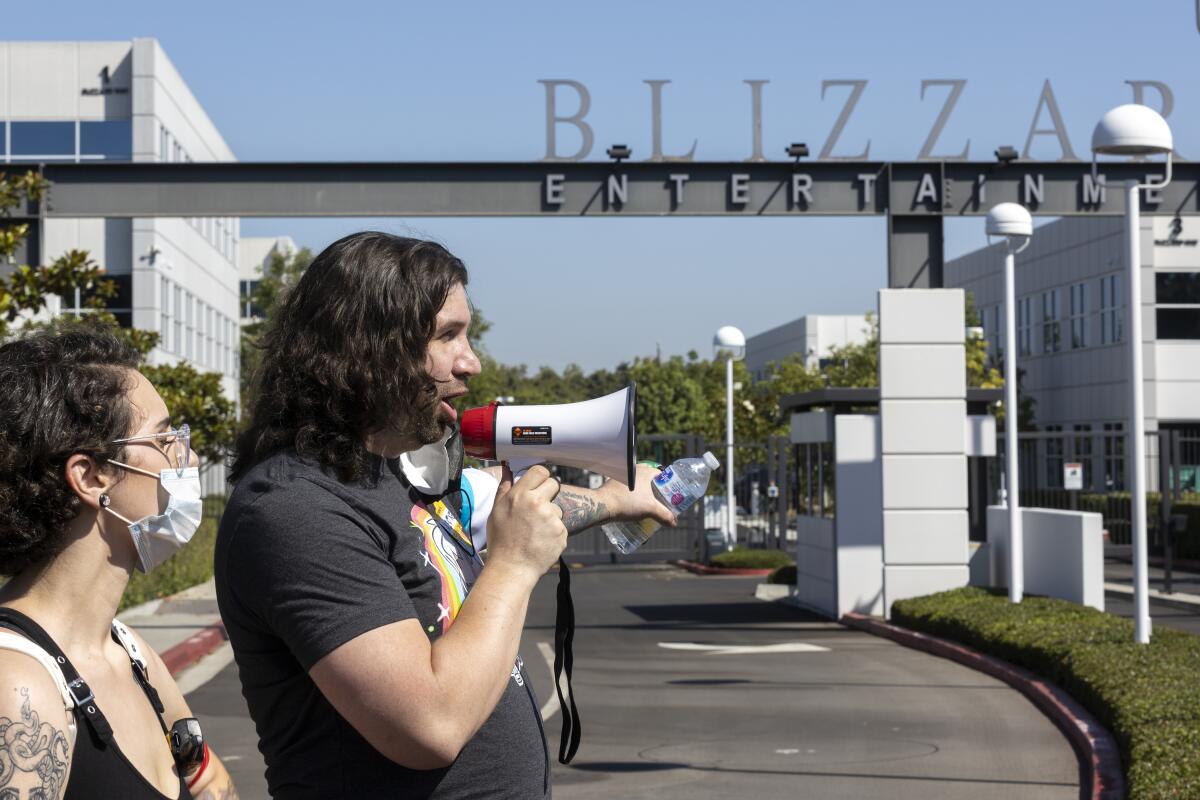Justice Department accuses Activision Blizzard of ‘suppressing’ esports salaries

- Share via
The Department of Justice on Monday announced a civil antitrust lawsuit against the video game giant Activision Blizzard, alleging that the Santa Monica-based firm limited competition among esports players in its professional “Overwatch” and “Call of Duty” leagues.
“Professional esports players — like all workers — deserve the benefits of competition for their services,” said Assistant Atty. Gen. Jonathan Kanter in a written statement. “Activision’s conduct prevented that from happening.”
Microsoft is set to acquire Activision Blizzard for $69 billion — a deal that recently cleared several regulatory hurdles on its path toward closure.
The Justice Department’s complaint said that the independently owned teams that competed in the two Activision leagues agreed to a “competitive balance tax” that “effectively operated as a salary cap.” This, the complaint said, violated the Sherman Antitrust Act by limiting competition in the league and suppressing players’ pay.
“Teams were fined if their total player compensation exceeded a threshold set by Activision each year,” the complaint said. “For every dollar a team spent over that threshold, Activision would fine the team one dollar and distribute the collected sum pro rata to all non-offending teams in the league.”
Following a Justice Department investigation into the tax, according to the document, Activision told teams in late 2021 that it would no longer enforce it. Still, “Activision should be enjoined from implementing the Competitive Balance Tax or any similar rule or restraint” in the future.
The complaint, filed today in the U.S. District Court for the District of Columbia, was accompanied by a consent decree proposal that, if approved, “would prohibit Activision from imposing any rule that would, directly or indirectly, limit player compensation in any of Activision’s professional esports leagues, or that would tax, fine, or otherwise penalize any team for exceeding a certain amount of compensation for its players.”
That consent decree, if approved by the court, would also require the gaming company to certify that it didn’t have competitive balance taxes in any of its esports leagues, as well as to notify esports teams and players of the final judgment.
Activision Blizzard spokesperson Delaney Simmons said in an email to The Times that the company has “reached a settlement over this issue.”
“When we launched The Overwatch and Call of Duty Leagues, we wanted to create viable career opportunities for the players requiring minimum salaries and mandatory benefits as part of player contracts,” the statement said. “As a league, we also wanted our products to be competitive, so we carefully designed and implemented the Competitive Balance Tax.”
The company maintains that the competitive balance tax was lawful and did not adversely affect player salaries. “The tax was never levied, and the leagues voluntarily dropped it from our rules in 2021,” the company said.
The Justice Department’s complaint is not the only legal snarl Activision Blizzard has faced in recent years.
In February, the company agreed to pay $35 million to settle allegations that it lacked systems for collecting employees’ workplace misconduct complaints and had violated a whistleblower protection rule.
In 2022, after an Equal Employment Opportunity Commission lawsuit, Activision Blizzard agreed to set up an $18-million fund for employees who dealt with sexual harassment or discrimination. That was on top of employee walkouts and lawsuits over the company’s culture.
The former California Department of Fair Employment and Housing at one point accused Activision’s Blizzard division of a “pervasive frat boy workplace culture” and rampant pay discrimination.
The gaming industry and the competitive world of esports have grown in popularity in recent years, and — in the process — brought along major paydays for some.
According to industry researcher Newzoo, 2.9 billion people played video games in 2020, and that number could hit 3.6 billion by 2025. According to the trade group Entertainment Software Assn., Americans spent a total of $56.6 billion on gaming in 2022.
Gaming has growing cultural cachet too, including a recent spate of well-received Hollywood adaptations.
More to Read
Inside the business of entertainment
The Wide Shot brings you news, analysis and insights on everything from streaming wars to production — and what it all means for the future.
You may occasionally receive promotional content from the Los Angeles Times.











